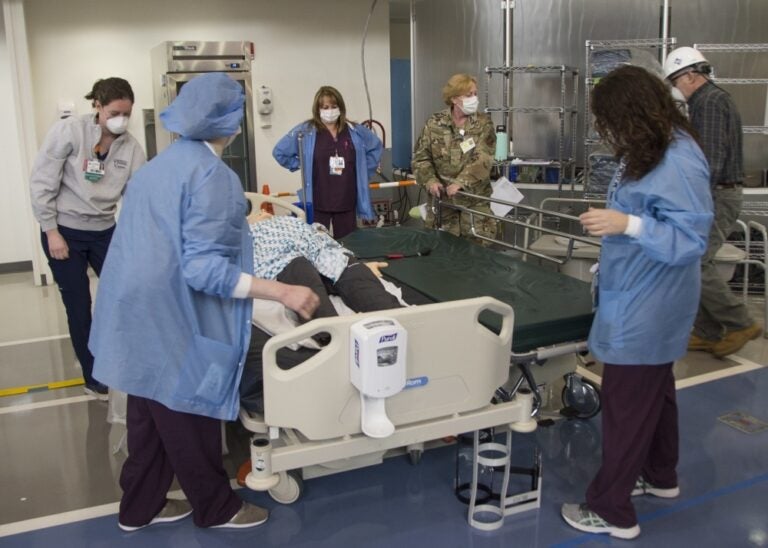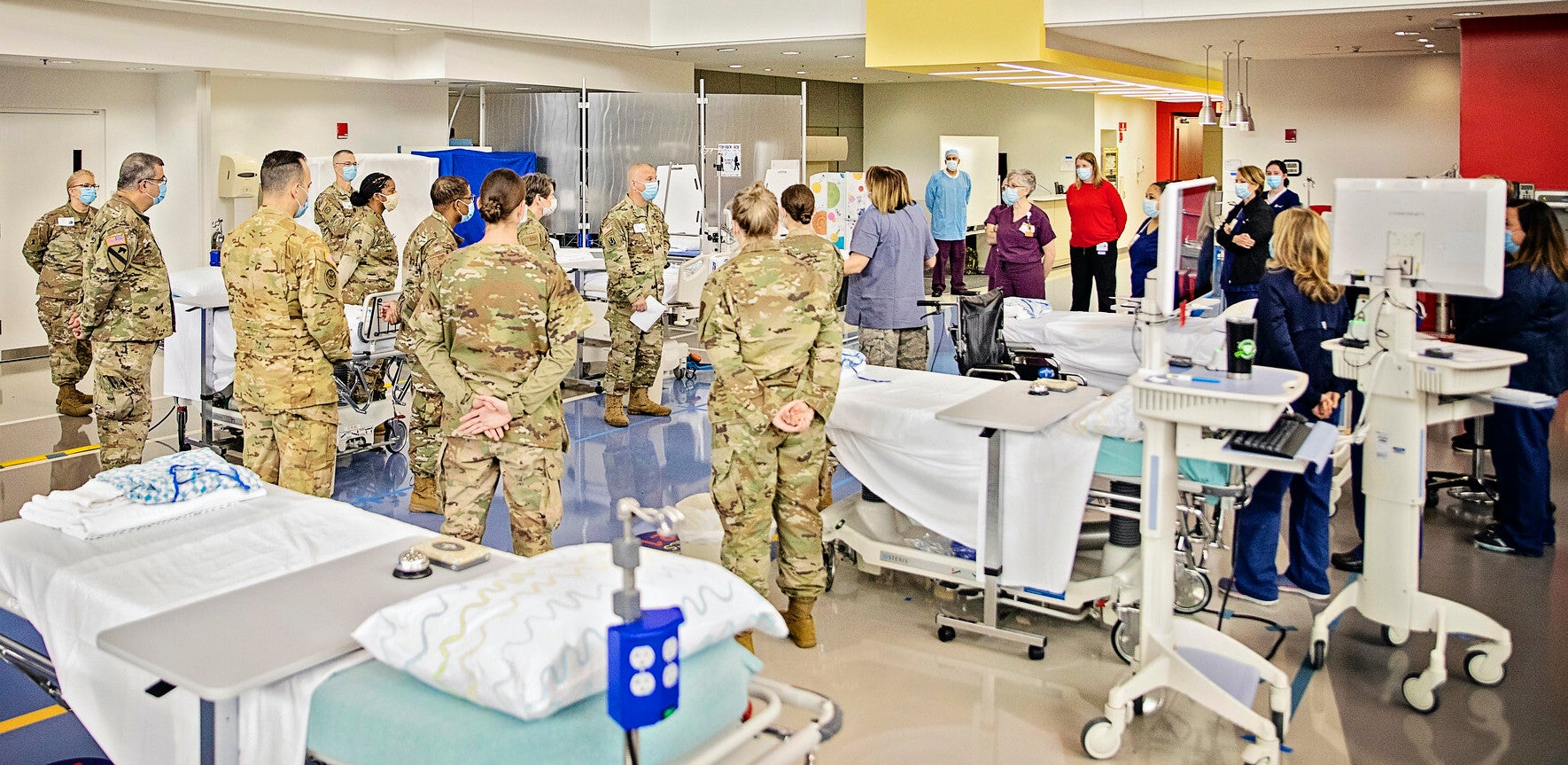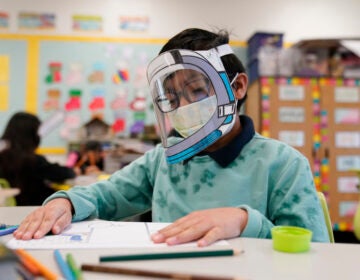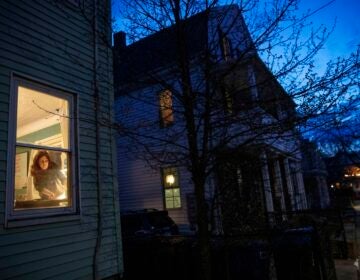Coronavirus update: New data shows race discrepancy in Delaware cases
Latinx and black Delawareans have a higher rate of infection than whites, according to new numbers released by the state.

Staff members of the duPont Hospital for Children, ChristianaCare hospital system and the Delaware National Guard conduct training at the duPont hospital site. (Delaware National Guard)
Are you on the front lines of the coronavirus? Help us report on the pandemic.
One hundred people have died of the coronavirus in Delaware as of Friday afternoon. The state reported eight more deaths Friday. The total number of cases is up 134 to a total of 3,442. Delaware hospitals are currently treating 277 coronavirus patients.
Schools canceled for remainder of the year
Delaware students will continue remote learning for the rest of the school year, Gov. Carney announced Friday.
“There’s obviously no replacement for in person instruction in classrooms in terms of the relationships and services,” Carney said. “Between now and the end of what would have been the school year we want to get as much benefit for our students as possible.”
“To the Class of 2020, we know how disappointing this is for you in particular,” Lincoln Hohler, superintendent of the Brandywine School District wrote in a letter to district families. The district is taking a poll of seniors to determine the best way to move forward with things like prom and graduation in a way that follows state’s emergency restrictions.
“Know that we miss you and can’t wait until we can all be together again – safely,” Hohler wrote.
New demographic data shows wide racial discrepancy
On Friday, Delaware launched a new portal to provide a clearer picture of coronavirus cases in the state that has revealed a big gap along racial lines.
Hispanic or Latino residents have a much higher rate of infection, 60.1 cases per 10,000 residents. Black Delawareans also have a higher infection rate at 46.1 cases per 10,000. The rate for whites is just 13.1 per 10,000.
Out of the state’s 3,442 cases, 968 are black, 912 are white, 519 are Hispanic/Latino, 46 are Asian/Pacific Islander. The state doesn’t have racial identity information for 857 cases.
Sixty-one percent of those who have died were white, 24 percent were black.
To address the gap, Gov. John Carney said the state is moving to “over testing” in areas where African American and Latinx residents live. “Right now there’s intense focus on testing an outreach to the Hispanic, the Haitian/Creole population, and Caucasian poultry worker population in Sussex County and that’s taken a lot of our resources and a lot of our time,” Carney said. “We have a lot of work to do there and we are adjusting our plans based on what we’re seeing on the ground in terms of test results.”
Coronavirus is spreading faster in southern Delaware’s Sussex County than anywhere else in the state. The infection rate in Sussex is 74 out of every 10,000 residents.
By comparison, the rate in northern Delaware is 25 cases per 10,000 residents.
Southern Delaware has a higher concentration of elderly residents, and that’s especially concerning because most of the state’s deaths are among seniors. “Overwhelmingly, these are elderly Delawareans, sadly. which underscores again the need for us to protect those populations, as we look at this spread in Sussex County knowing that the population there has a lot of retirees and a lot of elderly citizens,” Carney said.

Alternate hospitals ready but not needed yet
Worried that the coronavirus could overwhelm Delaware’s hospitals, state officials have set up two alternate care sites and are making plans for a third.
But so far the state’s hospitals don’t have overflow patients.
A.J. Schall, who heads the Delaware Emergency Management Agency, told WHYY that Delaware hospitals can handle 700 COVID-19 patients. But the current patient count, announced at 2 p.m. Friday, is 277, including 63 in critical condition.
“Right now they are managing fine. There is no dire need,’’ Schall said of the state’s hospitals, which include Christiana, Wilmington, Bayhealth and Beebe.
“There’s a few options but as for an alternate care site needing to be turned on right now because of a lack of beds, we do not see the need in the near future. Hopefully we don’t but it can be ready in case we do.”
Should the COVID-19 patient count exceed capacity, adult patients with other illnesses would be transferred to the alternate sites in New Castle County – the duPont Hospital for Children north of Wilmington and the Governor Bacon long-term care facility in Delaware City. Authorities are also contemplating setting up a tent hospital in Sussex County if necessary.
Even if they don’t have overflow patients and the alternate sites never get a patient, Schall says they’re learning lessons for the future.
“When the time is right we’ll do our after-actions, document them, update our plans, figure out a way to make everything a little bit more efficient if and when the next time does come around,’’ Schall said.
The duPont Hospital site was set up with the help of the Delaware National Guard, which Gov. John Carney activated when he declared a State of Emergency on March 12.
Lt. Col. Rachel Stephens, a registered nurse, helped set up the alternate facility at the duPont Hospital for Children north of Wilmington and prepares there with existing staff daily.
“It’s much better for the community at large if they never need to use us,’’ Stephens said. But it’s important that we’re there so that if they do have to we’re already in place and ready to accept patients.”
Stephens said she and others never anticipated having to prepare for an active pandemic.
“I know for some of the civilian nurses seeing the military coming in, it was kind of, ‘Oh, wow, this is really something if they have to bring the military in.’ ”
Delaware opens doors to out-of-state health care workers
In an effort to get more health care professionals to help care for coronavirus patients into the state, Delaware is relaxing its requirements for workers from out of state. Under the twelfth modification of his state of emergency order issued last month, Gov. John Carney says anyone who once held a license to practice medicine in any U.S. jurisdiction can now provide health care in Delaware.
That means anyone who has an inactive, expired or lapsed license can help patients, as long as their license was in good standing for five years before it went inactive.
“Delaware’s fight against COVID-19 is far from over,” Carney said. “This updated declaration will allow even more health care workers to assist in Delaware’s response.”
The modification covers pharmacists, respiratory therapists, physician assistants, paramedics, emergency medical technicians, and nurses. Out-of-state providers still must register with the Medical Reserve Corps to help out in Delaware.
The updated emergency order also allows marriage licenses to be issued via video conference.
Town hall meetings for small businesses and residents
Next week, the state will launch a series of virtual town hall meetings to engage small business leaders and residents on efforts to reopen the state.
Representatives from the Division of Small Business and the Delaware Prosperity Partnership will meet with members of the General Assembly, small businesses and local chambers of commerce to get feedback on the state’s plans.
Lt. Gov. Bethany Hall-Long will hold similar meetings with residents via Zoom video calls.
“To successfully reopen will require all communities and sectors of our economy to participate,” Hall-Long said. “I look forward to hearing from Delawareans and gathering their recommendations to keep people safe, and able to return to work, and make our state stronger and healthier.”
Before the state starts the process of reopening, Carney said there first needs to be 14 days of declining symptoms and positive cases in the state. There also needs to be extensive testing in place for health care workers.
WHYY is your source for fact-based, in-depth journalism and information. As a nonprofit organization, we rely on financial support from readers like you. Please give today.



![CoronavirusPandemic_1024x512[1]](https://whyy.org/wp-content/uploads/2020/03/CoronavirusPandemic_1024x5121-300x150.jpg)



